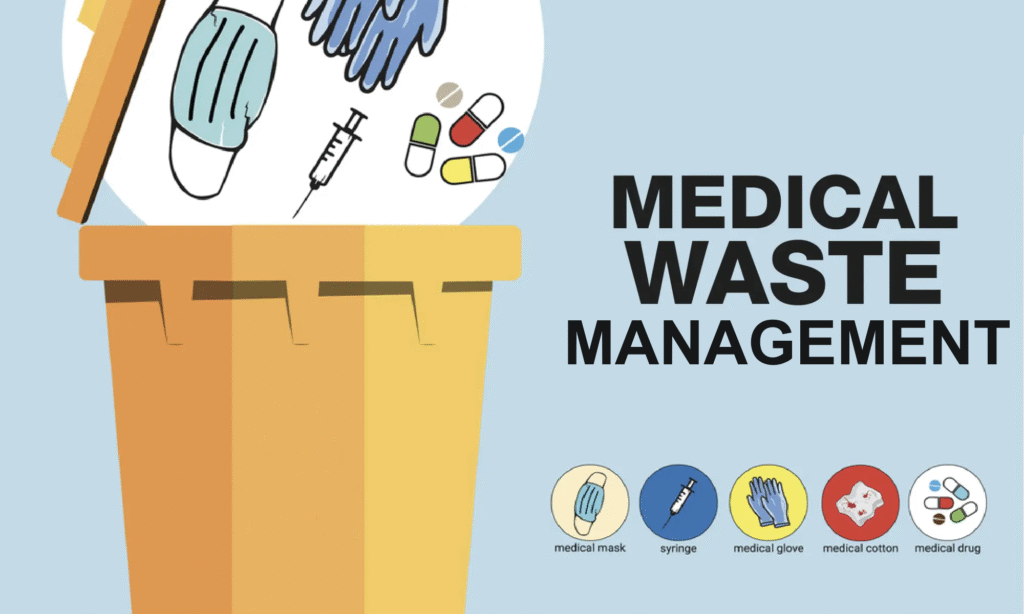Importance of Hospital Waste Management

Hospitals, clinics, and healthcare centers are essential for improving human health and saving lives. However, these facilities also generate a significant amount of waste, including biomedical, chemical, and hazardous materials. If not handled properly, this waste can pose serious risks to public health, the environment, and even hospital staff. Hospital waste management is therefore not just a regulatory requirement but a critical practice for maintaining hygiene, ensuring safety, and promoting sustainable healthcare systems.
What is Hospital Waste?
Hospital waste, often referred to as biomedical waste, includes all types of waste generated in healthcare establishments such as hospitals, clinics, laboratories, and research centers. This waste can be categorized into:
- General Waste: Similar to household waste, including paper, packaging, and food waste.
- Infectious Waste: Contaminated materials like bandages, swabs, and personal protective equipment (PPE).
- Sharps Waste: Needles, syringes, scalpels, and other sharp instruments.
- Pharmaceutical Waste: Expired medicines, vaccines, and chemical residues.
- Pathological Waste: Human tissues, body parts, and fluids.
- Radioactive Waste: Waste from diagnostic and treatment processes like radiotherapy.
Why is Hospital Waste Management Important?
1. Protecting Public Health
Improper disposal of biomedical waste can spread infections such as HIV, hepatitis B, and hepatitis C. Used needles or contaminated instruments, if mixed with general waste, can directly expose waste handlers and the public to life-threatening diseases.
2. Preventing Environmental Pollution
Hospital waste often contains harmful chemicals, plastics, and radioactive substances. If dumped in open areas or landfills, these materials can leach into the soil and groundwater, contaminating natural resources. Incineration without proper technology can also release toxic gases like dioxins and furans into the atmosphere.
3. Compliance with Regulations
Governments across the world, including India, have strict biomedical waste management rules. Hospitals must follow guidelines for segregation, storage, and disposal. Non-compliance not only endangers lives but can also lead to penalties, closure of facilities, and legal action.
4. Maintaining Hospital Hygiene and Reputation
A hospital is a place of healing, and cleanliness is directly linked to patient trust. Proper waste management ensures a hygienic environment for patients, visitors, and staff. Hospitals with robust waste management systems also enhance their credibility and reputation.
5. Sustainability and Resource Recovery
Modern waste management practices encourage recycling and recovery of resources. For example, certain types of plastics and metals can be recycled, reducing the demand for raw materials. Sustainable practices also align with global efforts to achieve a circular economy.
Key Steps in Hospital Waste Management
1. Segregation at Source
Waste should be segregated at the point of generation using color-coded bins as per biomedical waste rules. For example:
- Yellow: Infectious and pathological waste
- Red: Contaminated plastics and disposables
- White: Sharps
- Blue: Glass and metallic implants
2. Collection and Transportation
The segregated waste must be collected in secure containers and transported safely within the hospital to avoid accidental exposure.
3. Treatment
Different technologies are used to treat hospital waste before final disposal
- Autoclaving: Using steam under pressure to sterilize infectious waste.
- Incineration: Controlled burning of hazardous waste at high temperatures.
- Chemical Treatment: Using disinfectants to neutralize waste.
- Microwaving: Destroying pathogens through heat.
4. Final Disposal
After treatment, waste is disposed of safely in sanitary landfills, recycling facilities, or incinerators designed with pollution-control systems.
Role of Technology in Hospital Waste Management
Modern hospital waste management relies heavily on advanced technology. From automatic waste segregation systems to energy-efficient incinerators, technology ensures safety, efficiency, and compliance. Smart monitoring systems also help track waste volumes and disposal methods, making hospital operations more transparent.
Kelvin Water Technologies: A Trusted Partner in Waste Management
Kelvin Water Technologies is a leading name in environmental and waste management solutions in India. With years of expertise, the company designs, manufactures, and supplies a wide range of equipment and systems tailored for effective hospital and biomedical waste management.
Key Solutions Offered by Kelvin Water Technologies:
- Biomedical Waste Treatment Systems: Autoclaves, shredders, and disinfection systems for safe treatment.
- Incinerators: Advanced incineration units with pollution control measures to ensure eco-friendly disposal of hazardous waste.
- Sewage Treatment Plants (STPs) and Effluent Treatment Plants: Essential for treating hospital wastewater contaminated with chemicals, pathogens, and pharmaceuticals before discharge.
- Composting Machines: On-site solutions for managing organic and food waste generated in hospital cafeterias and residential facilities.
- Consulting and Maintenance Services: End-to-end support including installation, training, and regular maintenance to ensure compliance with biomedical waste rules.
Benefits of Partnering with Kelvin Water Technologies
- Expertise in Sustainable Solutions
- Custom-Built Systems to Match Hospital Needs
- Environment-Friendly Technologies with Low Emissions
- Affordable and Reliable Equipment
- Comprehensive Support and Training
Conclusion
Hospital waste management is not just a legal obligation but a moral responsibility of healthcare providers. It ensures the safety of patients, staff, and communities while protecting the environment from harmful pollutants. Effective waste management practices—segregation, treatment, and disposal—create a safer healthcare environment and support sustainable development.
With the growing demand for eco-friendly and reliable waste management systems, companies like KWTPL play a pivotal role in revolutionizing hospital waste management in India. By providing innovative, compliant, and sustainable solutions, Kelvin Water Technologies empowers hospitals to fulfill their duty of care while safeguarding public health and the planet.